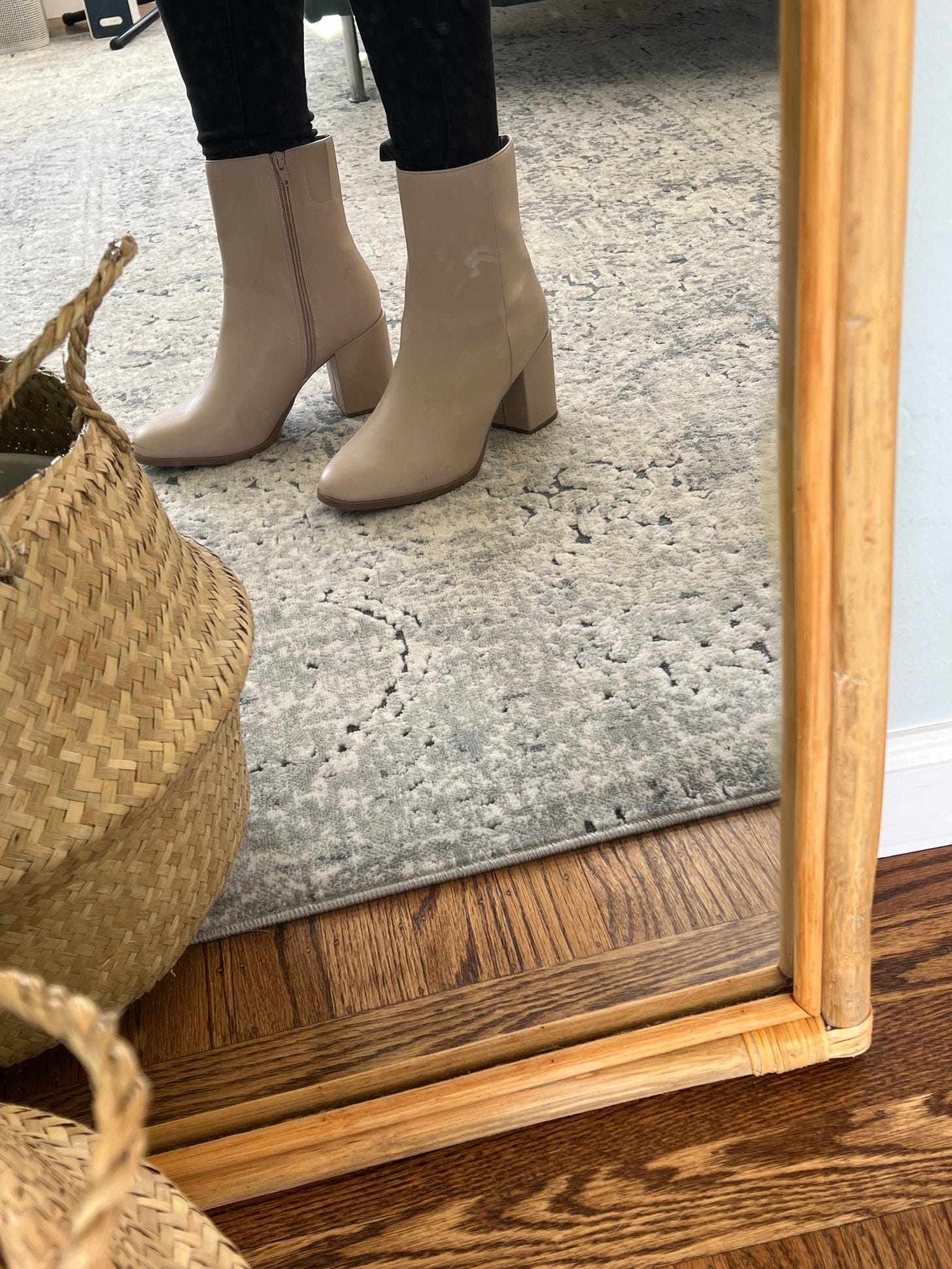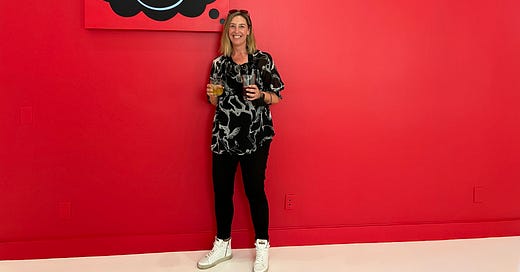On better shopping ... and better NOT shopping
Plus, world leaders are talking about plastic and it's actually kind of real, I think!
Episode 3 of Everybody in the Pool is live now, and we’re talking shopping!
After energy, food and consumer goods are the biggest cause of carbon emissions in a household. In fact, the stuff we buy accounts for something like a third of global carbon emissions, although specific measurement is hard to come by.
The emissions come from sourcing the raw materials to make the thing; the packaging; the shipping; the actual consumption; and eventually, the disposal.
Everything has what I like to call a True Cost—again, hard to quantify, until we have a price on carbon, but a cost that takes into account all of those other factors. The consumer goods giant Unilever is actually including carbon cost on the labels of something like 70,000 products.
When you start to think of products in that way, you realize, among other things, that we spend a ton of money and emit a lot of carbon moving, say, water around the world. The water in beverages, dish soap, liquid laundry detergent, toothpaste, shampoo, actual literal water. And water-based items are heavy, so you need a lot of gas or diesel to move them, they’re bulky, so you need a lot of trucks and shipping containers.
Those realizations lead to things like shampoo and moisturizer bars, a return to powdered detergent, detergent sheets, toothpaste pellets. It’s an argument for SodaStream, tap-water, even that briefly buzzy startup Cana, which was building a molecular at-home beverage printer. (I visited it, it was pretty cool! But … hardware is hard.)
Then there’s packaging. Most stuff comes in plastic, some more than others. Some goods come in recycled plastic and some in plastic that’s been recovered from the ocean. Some come in glass or stainless steel (if you’re in DC, check out Spring Eats, one of my very first investments, for milkman-style home delivery of sustainably packaged groceries!). Most stuff contains chemicals but some stuff has far fewer chemicals, which is not only good for you but good for the ecosystem when you get rid of the packaging or the inch of leftover lotion you can never quite get out of the bottle.
Once you’re paying attention to these things (and fully two-thirds of consumers say they want more sustainable product options), you open up a whole new world of product design and options, and things to look for at the store.
That’s where things get daunting, confusing, and annoying—because how do you know what’s real and what isn’t real, right?
And that is the type of problem that can generate a lot of opportunities.
The companies in the pool
Increasingly, I’m seeing startups and guides that make it easier to shop sustainably. On this week’s episode, I talked with Lizzie Horvitz, founder of Finch, which is a portal and social recommendations site for finding sustainable goods, and a Chrome browser for shopping for better alternatives on Target and Amazon. (Full disclosure that Finch is a portfolio company of Amasia, where I’m a venture partner.)
I actually invested in another browser extension company, called United by Zero, and there’s one called Beni (which I would have liked to invest in!) that focuses on secondhand alternatives to things you’re shopping for—both excellent alternatives for just the e-commerce side of things.
But what I like about Finch is that they’re actually scoring products in six categories: climate, water waste, human wellbeing, ecological footprint, and raw materials. That cuts through some of the greenwashing that’s already occurring with product packaging (Lizzie told me that, among other things, putting something in brown paper packaging makes people think it’s a sustainable alternative, even when it’s … totally not).
Also, there’s a reviews component, so that even if something gets a good score, there’s an actual human telling you whether it works, doesn’t works, or, in the bamboo toilet paper example we used on the podcast, whether it, you know. Scrapes your bottom.
And Finch can expose you to products you didn’t know existed, like laundry detergent sheets.
Now, Finch is a brand new company working on mass and scale and scoring products is a process, so don’t expect to find everything you ever buy—although between personal care, kitchen, bathroom, baby, and laundry, plus bedding, well. It’s an awful lot.
And like most e-commerce businesses, Finch is about the data. If, for example, women between 20 and 35 say they aren’t worried about Dove’s packaging, as one example that Lizzie gave me, but they are worried about the chemicals in the body wash, that’s valuable to Dove. Also, if people end up buying the sustainable product on Target some impressive percentage of the time, it’s a powerful signal to the retailer to stock the green stuff.
This is how early shopping adopters—a-shop-ters?—have the ability to start to change the conversation, the products, the packaging, and the store shelves.
Now, a reminder here that the actual best thing you can do is straight up consume less. What you do consume, buy it to last. When you’re done with it, pass it on or donate it to Goodwill (I just joined the board of SF Goodwill!). But if you are shopping, make good choices, won’t you? Be an influencer!

Plastics summit
No, I know, I get it—it’s not all up to you. We need policy. We need a carbon tax (that’s for a future episode). We need a global treaty on plastic use oh heeeeyyy! That’s happening. Later this week, in fact, negotiators from around the world are getting together in Paris for the second of five rounds of talks designed to result in a binding global treaty on how to deal with plastics and the toxic chemicals inside them.
This is a very big deal. In March of 2022, global leaders agreed to work toward this binding agreement in a meeting some are calling as impactful as the Paris accords. Such an agreement could massively change the way consumer goods are packaged, designed, and disposed of; making your job as a consumer a whole lot easier. There could be taxes on plastics; incentive to create biodegradable alternatives; even mandates for recycling plastic or using recycled plastic.
All of that keeps chemicals and waste out of land, ocean, riverways, air, our DNA. You know. That kind of thing. Oh, and it cuts off the quiet lifeline that the fossil fuel industry is betting on even if we switch to electric transport and hydrogen airplanes. Plastic is, of course, made from petroleum. Leave it in the ground!
Thanks for reading, please subscribe to the podcast and tell a friend, and hey. Happy shopping!







If there is to be policy set forward for carbon tax, why do I get the feeling most of that burden will be placed onto the consumer? There needs to be costs directly associated by weight of product like we do with fruits, vegetables, meat and pretty much any consumable product. If there is a carbon tax incentive then there should also be a tax reward. Again, I have seen hundreds of articles and blogs talking about the taxes but none of the rewards. Why aren't tax payers benefiting from their local state and federal impacts on our preservation goals for fish, game, and wildlife habitats? Surely we are entitled to a kind of tax rebate fund for every organic carbon offset that we are currently paying for don't we? I think an incentive structure along with a tax code that measures and balances these effects would do well on both sides of the political aisle. Corporations and the rich cannot be the only ones who benefit from these ESG measures yet that is all I'm seeing with current legislation like "45Q".